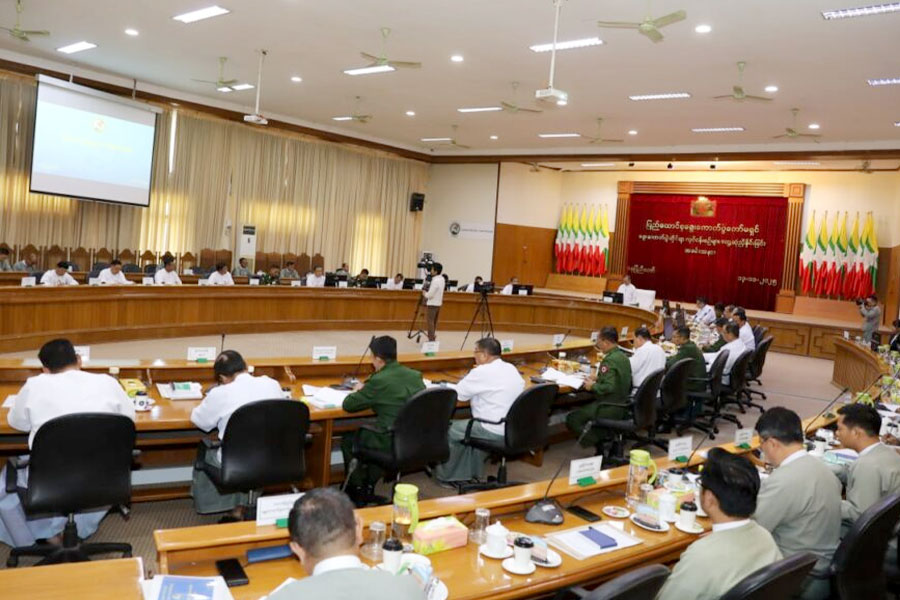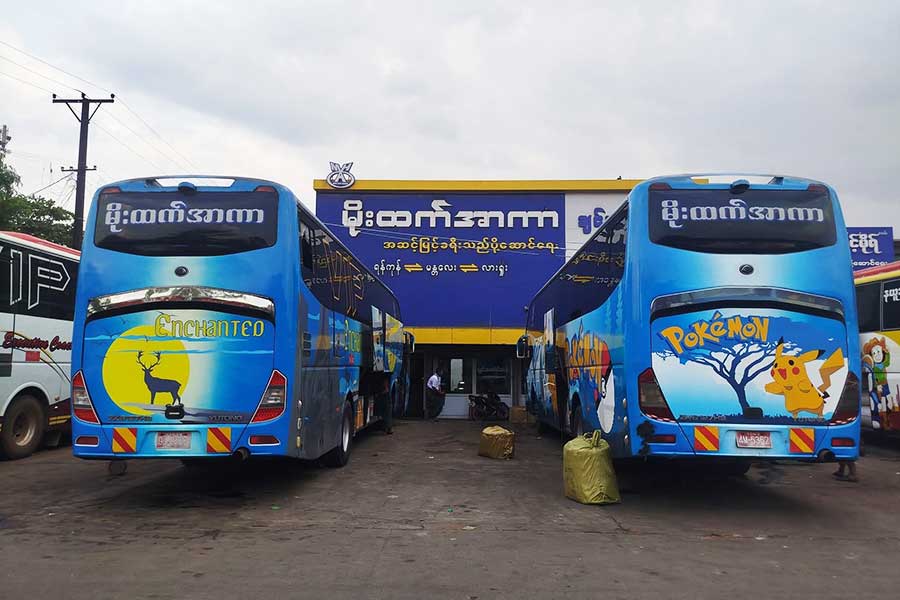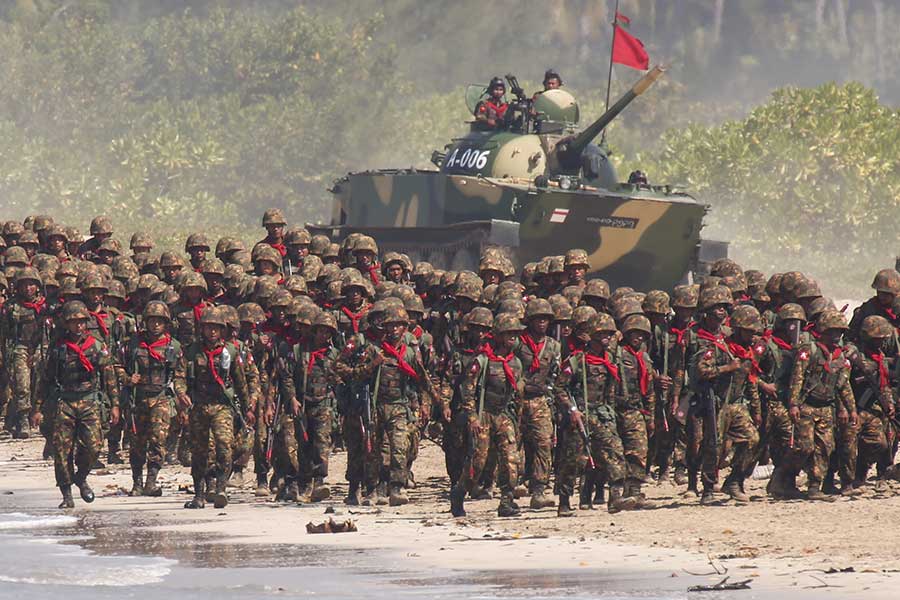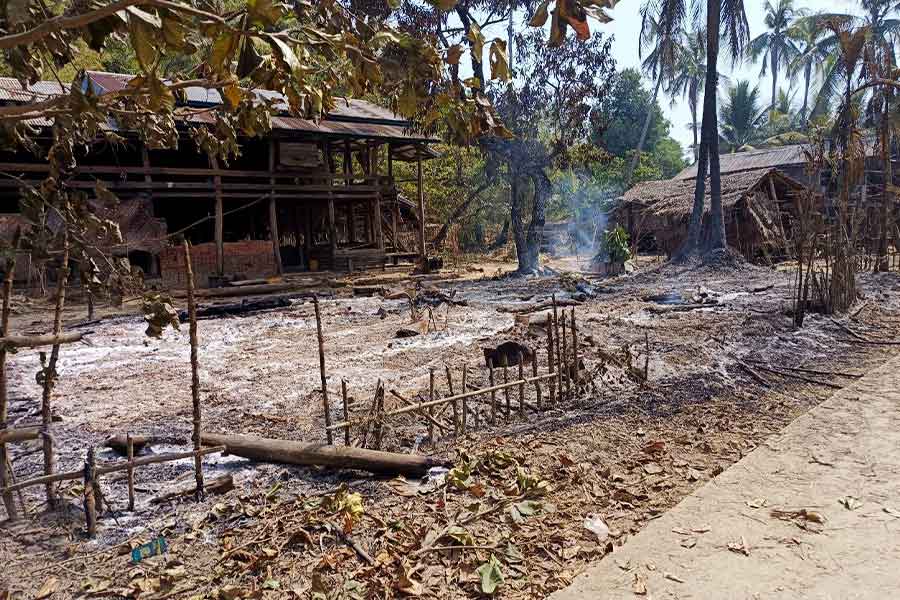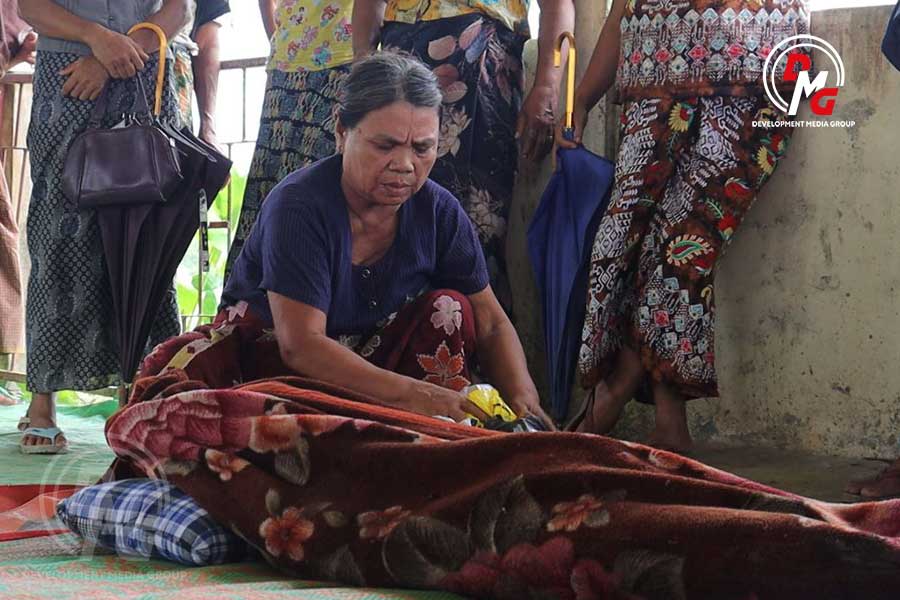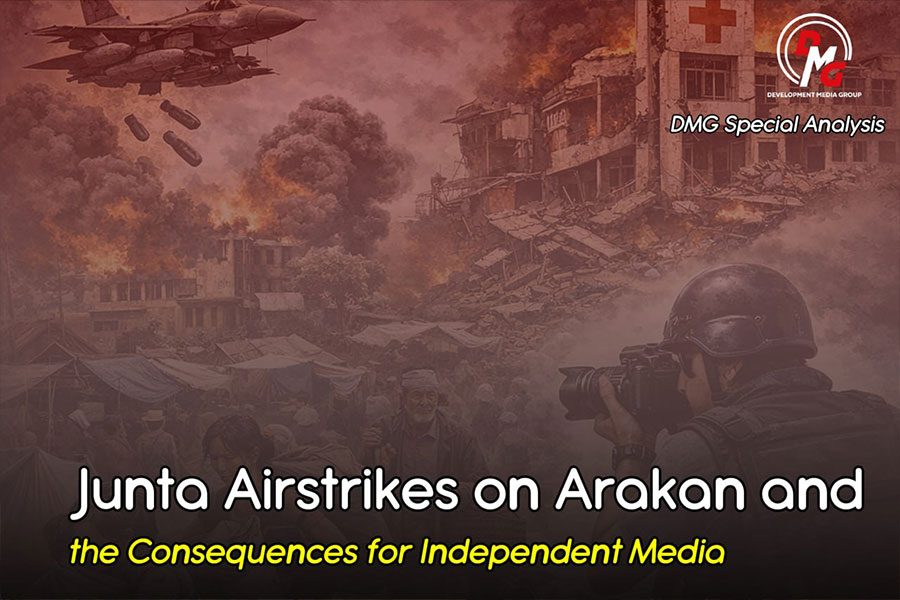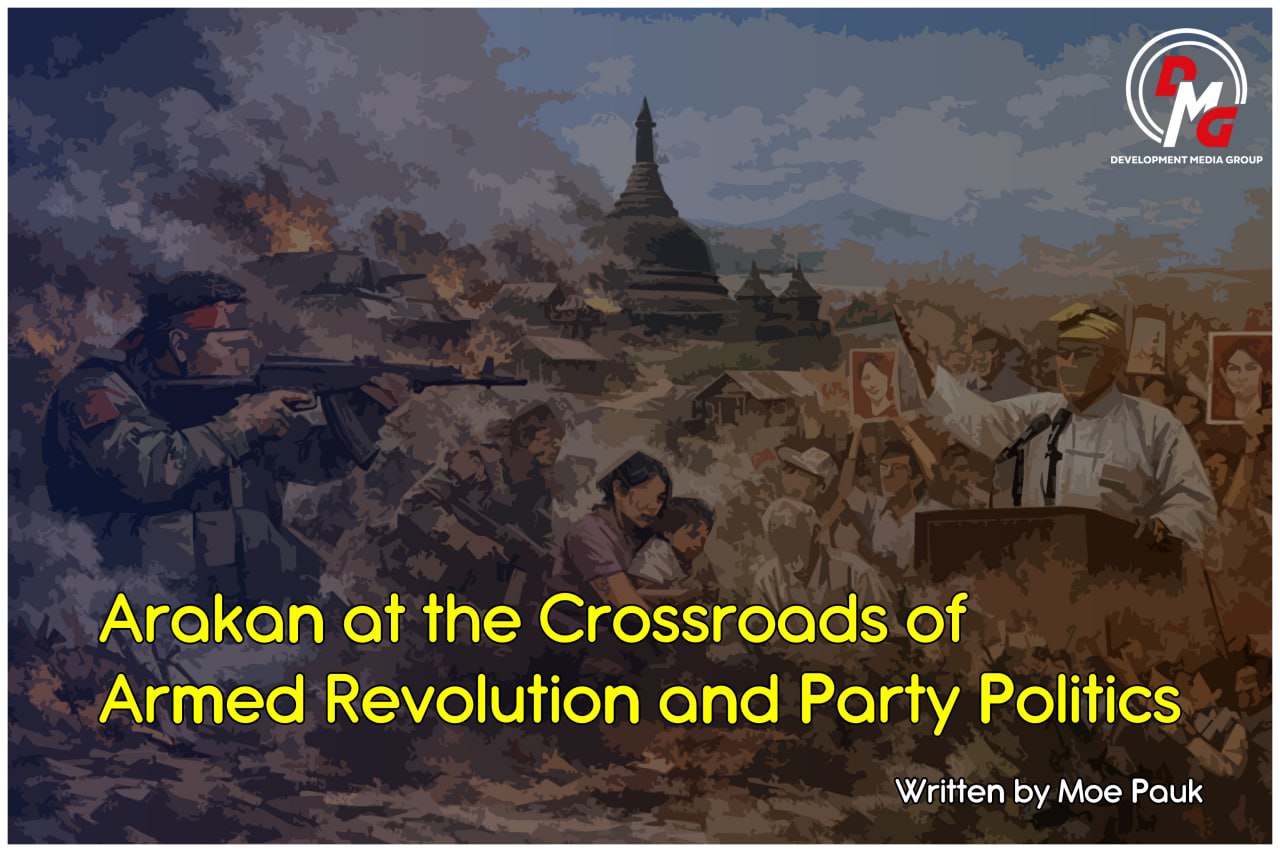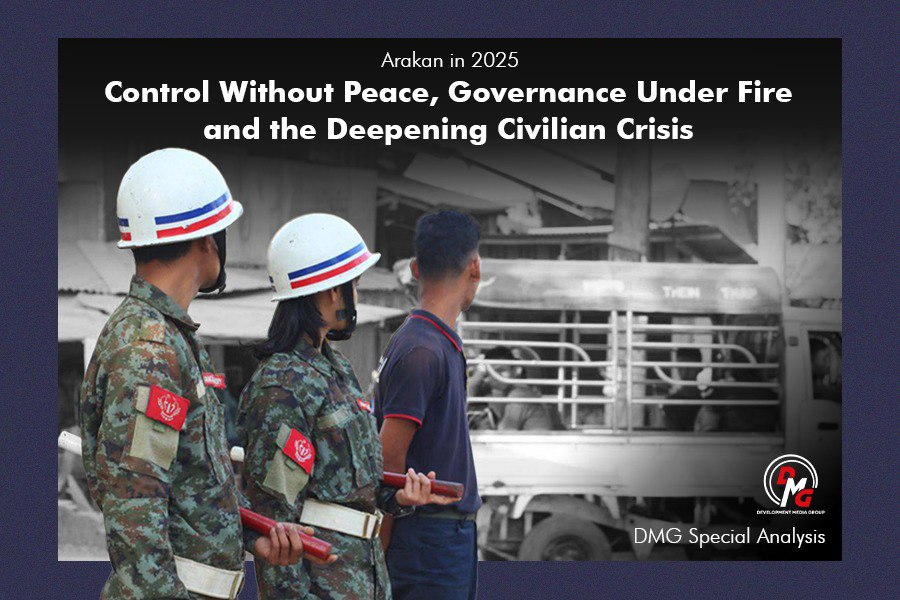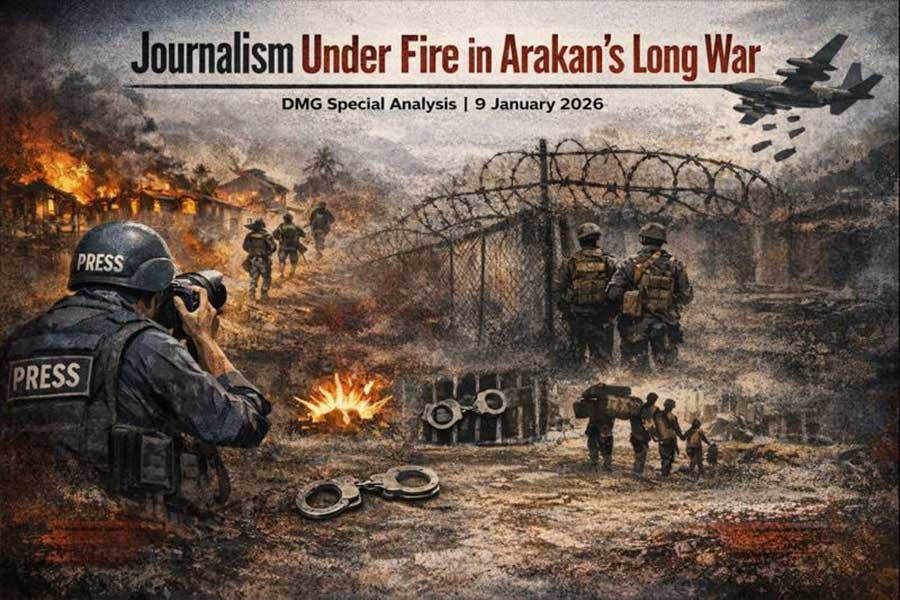- UEC announces 1,025 MPs elected in 2025 general elections
- Junta tightens travel restrictions on Arakanese people in mainland Myanmar
- Regime steps up offensive toward Arakan State via Ayeyarwady coastal route
- Elderly IDP killed, two others injured in junta airstrike on Kyaukphyu village
- AAPP urges urgent international action as junta crimes against humanity escalate
The Perpetuity of War
The armed conflicts between the Tatmadaw and the Arakan Army (AA) that started in early December 2018 in Arakan State have been escalating. They initially fought in places far from residential areas, but fighting now occurs near villages and towns and new fronts have opened in townships where war never broke out before.
05 Sep 2019
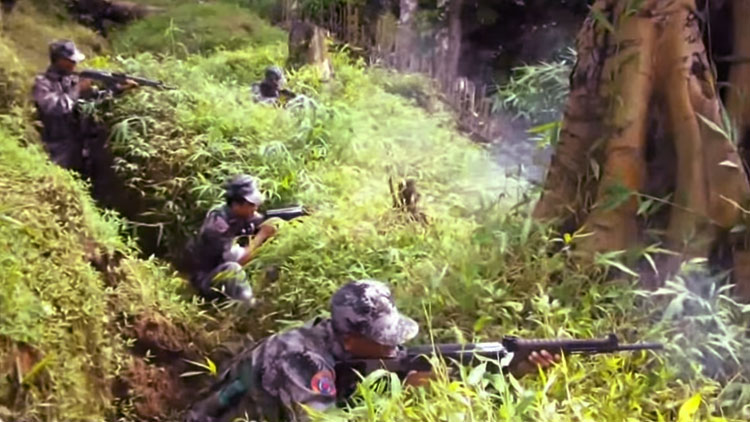
Nay Myo Linn | DMG
The armed conflicts between the Tatmadaw and the Arakan Army (AA) that started in early December 2018 in Arakan State have been escalating. They initially fought in places far from residential areas, but fighting now occurs near villages and towns and new fronts have opened in townships where war never broke out before.
There have been a few skirmishes between the Tatmadaw and the AA in the second week of August in Arakan State. But, the three members of the Northern Alliance _the Arakan Army, Myanmar National Democratic Alliance Army and Ta’ang National Liberation Army unexpectedly attacked at five locations on 15 August including the Defence Services Technological Academy in Pyin Oo Lwin and police station in Gote Twin in Naung Cho Township.
The three ethnic armed groups said that they attacked these places because the Tatmadaw kept conducting offensive attacks although they issued warning letters many times to stop the offensive operations against the AA. They also said that the attacks were defensive measures because the Tatmadaw was conducting offensive attacks in their territory and kept carrying out their “four cut strategy” that hampers the movements of the ethnic groups.
The Tatmadaw, however, denied the Northern Alliance’s claim. It announced that the attack was carried out to combat “committed terrorist attacks and disrupting the rule of law” following the seizure of billions of kyats worth drugs in Arakan and Shan State in July and August.
The attack claimed nine military personnel, three policemen and three civilians and MMK 282 million in damages, spokesperson of the President Office U Zaw Htay said. The attack is considered to be a “terrorist act”, he said.
“The act has a tremendous impact on the peace making process carried out by the government,” U Zaw Htay said in a press conference held at the Presidential Palace on 16 August.
The Tatmadaw issued a statement on 21 December last year for a ceasefire and indefinite peace. Section 7 states that “Tatmadaw is responsible for the country’s administrative mechanism, smooth and safe transportation and the lives and prosperity of people,” and” it would respond if necessary if these conditions were violated”.
After the attacks, armed confrontations in Arakan and northern Shan states have been escalating and civilian deaths in northern Shan State are on the rise. Clashes are intensifying in Mrauk-U, Minbya, Ponnagyun and Rathedaung townships in Arakan State. The Tatmadaw uses helicopters to attack the AA.
During two-days of fighting on 23 and 24 August in Minbya Township, four civilians were killed and three others were injured. Moreover, two villagers from Mrauk-U and Rathedaung Townships were injured.
The number of IDPs in townships in northern Arakan State and the capital Sittwe have reached over 60,000. Refugees are enduring hardships such as education access and health care services. Local residents are forced to flee from their homes due to ongoing skirmishes that are intensifying day by day.
The fighting in the region results collateral damage, civilian arrests and IDP number increase, Arakanese people want both sides to engage in dialogues aimed at creating peace at and to stop war as quickly as possible.
The government and the AA attempted to sign a bilateral ceasefire agreement. But, the AA has had some difficulties to try to sign the bilateral ceasefire agreement between the government and the AA because the Tatmadaw said that it could not recognize the existence of the AA in Arakan State, the AA’s spokesperson Khaing Thukha told the DMG.
“The main obstacle to sign bilateral agreement, this is their mentality. They said that they do not acknowledge our presence in Arakan State. They told us to go back Laiza. It was a situation we could not negotiate. For us, we must be in Arakan State,” Khaing Thukha said.
He added that peace talks cannot go on further if deployment of troops cannot be negotiated. Furthermore, both sides can make progress if the Tatmadaw renounces their attitude saying that they recognize the existence of the AA in Laiza.
“They said that democracy represents the people. For instance, the AA receives full support of all Arakanese people. So, it needs to recognize and respect the desire of Arakanese people. If so, it is easy to negotiate between us. If not, progress towards peace would be hampered,” Khaing Thukha said.
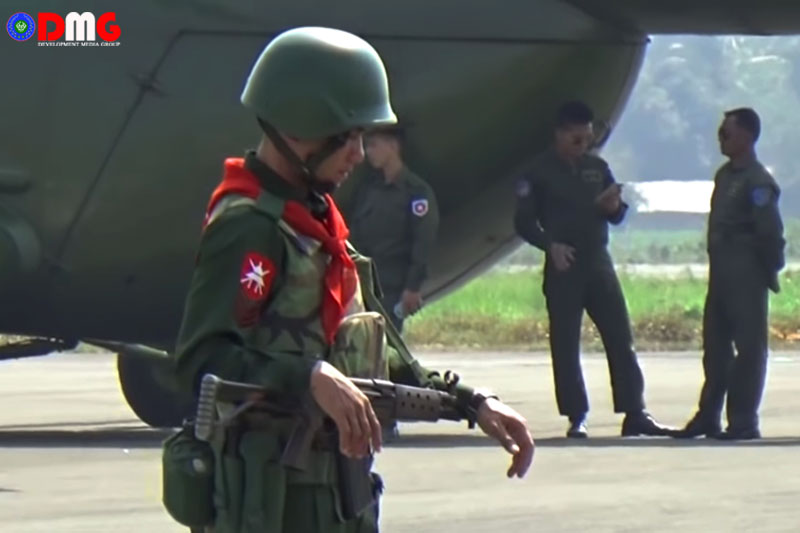
There will be challenges to be able to sign bilateral agreement due to dissent between the Tatmadaw and the AA about the deployment of the troops and fighting will likely continue unless a bilateral agreement can be signed, political analyst U Maung Maung Soe told the DMG.
The AA said that the leaders of the AA could not go and discuss these matters in government controlled area because they are concerned about their security since they have been charged under Counter-Terrorism laws. However, spokesperson of the Office of the President U Zaw Htay said that the AA leaders will have a one percent guarantee their security will be taken care of if peace talks are offered by the government.
Some political observers said that more clashes are likely to break out because three members of Northern Alliance, which called itself the Brotherhood Alliance, attacked five locations including the Defence Services Technological Academy in Pyin Oo Lwin on 15 August.
Major General Soe Naing Oo, chairperson of the Tatmadaw True News Information Team said in the press conference held on 23 August that “If they come and join peace talks, we will welcome them. If they want to keep on fighting, we are ready.”




